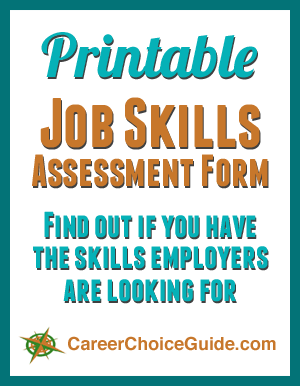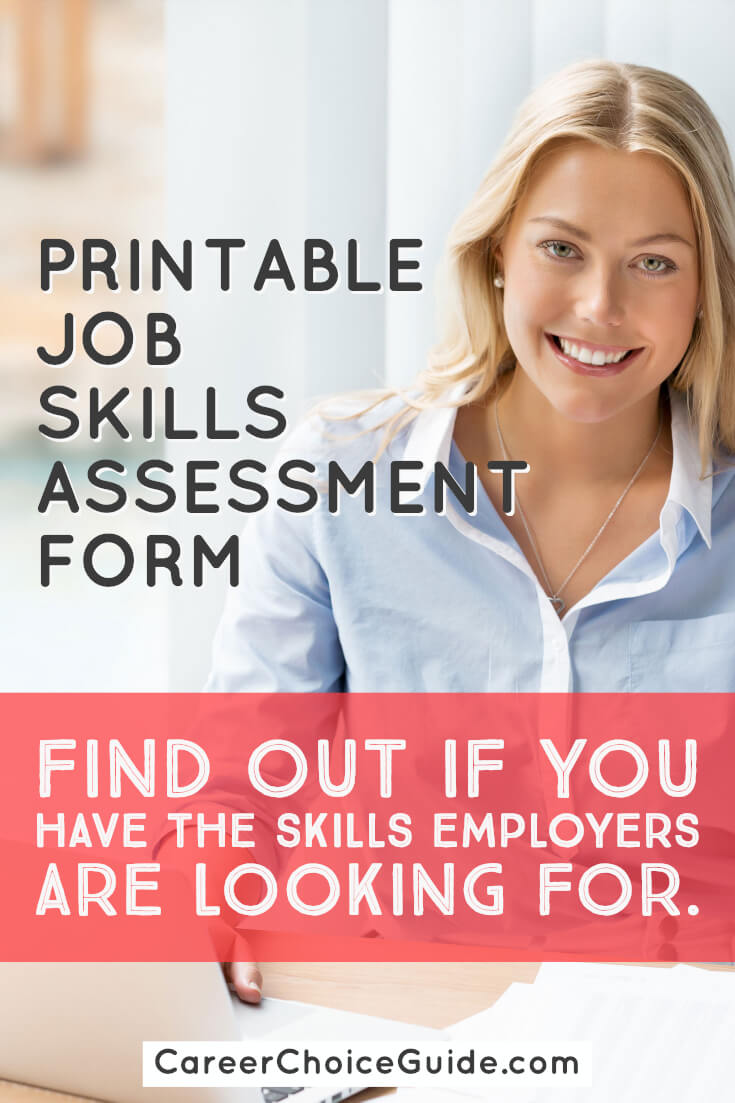Printable Job Skills List
Use this job skills list to do some simple research and find out if you have the skills, education and experience you need to get hired for a specific job.
Not sure whether you have all of the requirements necessary to be competitive in a specific industry? Here's an easy way to find out.
How to use a Job Skills List to Assess Your Own Marketable Skills
1. Collect Job Ads
First, you need to know what employers in your target industry are looking for when they hire a new employee. You're going to learn that information by surveying several job ads.
Choose a specific type of job that interests you, and collect 10 to 20 job ads for that type of work. Whenever possible, choose ads for jobs that are close to the city you want to work in because, in some jobs, employer expectations can vary by location.
If it's not possible to get a good sample of ads for jobs close to the city you want to work in, expand your search to include ads for jobs that are a bit beyond a reasonable commuting distance for you.
Remember, you don't have to apply to the jobs that are too far away. You're just trying to get a feel for the types of skills, education and experience employers are looking for, so you can determine whether you have everything required to be competitive in the labor market.
2. Complete the Top of the Form of the Printable Job Skills List
Fill out the name of the job you're researching, the date you completed the research, and note places where you found the job ads.
3. Complete the Chart Portion of the Form
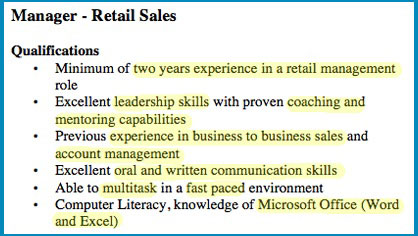 Sample Job Ad #1 With Requirements Highlighted
Sample Job Ad #1 With Requirements HighlightedStart with one of the job ads, and look for each skill, experience and educational requirement noted in the ad. It can help to highlight each item with a highlighter if you've printed up paper copies of the ads.
On the job skills list form, write each item in a box in the column called "Requirement". Put a 1 in the column labeled "# of Times Requested". If the ad notes that a skill is required, put a one in the "Required" column. If the skill is nice to have but not required, put a one in the "Nice to Have" column.
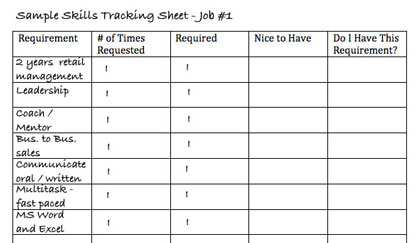 Form completed with requirements from job #1
Form completed with requirements from job #1Take the next job ad and list or highlight all of the skills, experience and educational requirements noted in job ad number two. If the requirement is already on your chart because it was on the first job ad, put a 2 in the corresponding box under the column "# of Times Requested", do the same for the columns marked "Required" for required skills and "Nice to Have" for any nice to have skills.
Next, add any new requirements that are listed in job ad number two but were not listed in the first job ad.
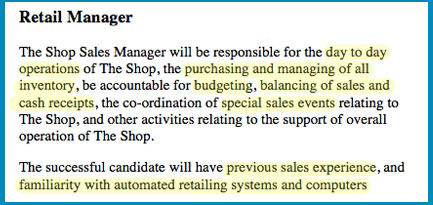 Sample Job Ad #2 With Requirements Highlighted
Sample Job Ad #2 With Requirements Highlighted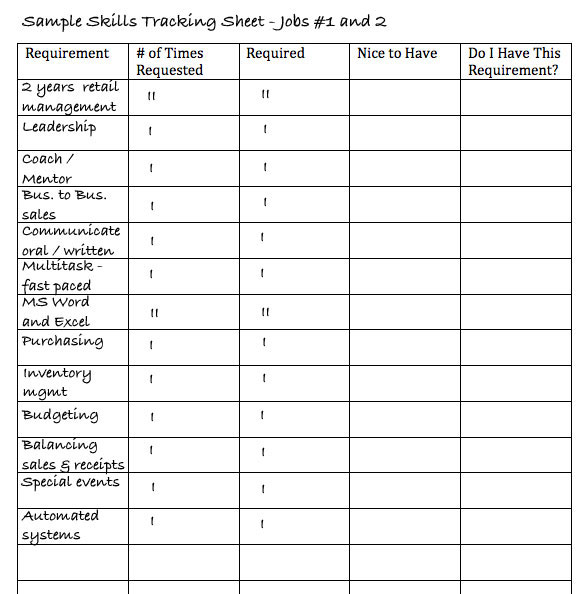 Form Completed With Requirements from Jobs #1 and #2
Form Completed With Requirements from Jobs #1 and #2Repeat this process for all of the job ads you have collected.
4. Honestly assess how well your skills fit with employers' expectations.
Next, take a look at all of the requirements for the jobs, and ask yourself honestly whether you have the skills, education or experience employers have asked for. Under the column "Do I Have This Requirement?", mark yes if you do have the qualification and no if you do not.
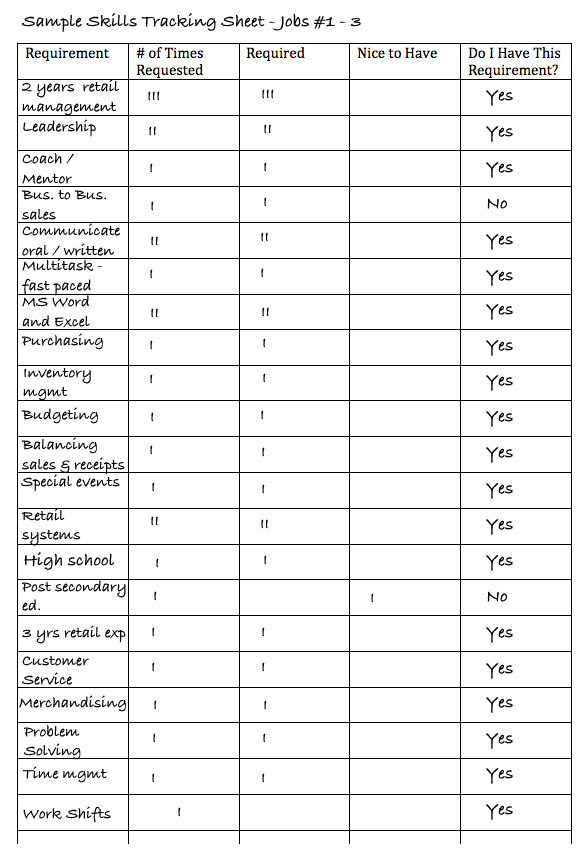 Form completed with requirements from jobs #1 to #3
Note - You should check more than three jobs to get an accurate assessment of the skills employers require. I've used three here just to give you an idea of how to use the form.
Form completed with requirements from jobs #1 to #3
Note - You should check more than three jobs to get an accurate assessment of the skills employers require. I've used three here just to give you an idea of how to use the form.Once you've completed the form, review it carefully.
Note the skills that are absolutely crucial to the job. Crucial skills and experience will be those items that are required most frequently in the job ads you've reviewed.
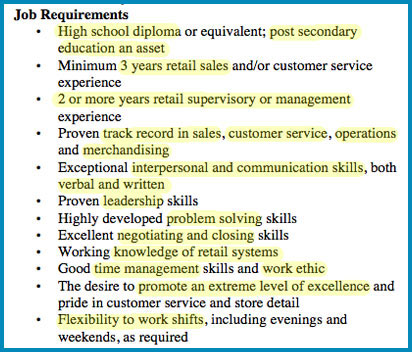 Sample Job Ad #3 - Requirements Highlighted
Sample Job Ad #3 - Requirements HighlightedAlso note skills that are helpful but maybe not crucial (those that are requested less frequently).
Compare that with the skills you have, and determine whether you have all of the most important skills employers require for that particular job.
If you do, great!
Be sure to include good descriptions of those important skills on your resume.
If you don't have all of the essential skills, and you definitely want to pursue work in this field, you'll need to think through ways to develop those important skills.
Depending on the type of skill you need to build, and the type of industry you want to work in, you might develop skills to make yourself more marketable to employers through:
- additional education and training
- volunteer work
- internships
- taking on a project
- or working with a mentor
You may also need to make a tough decision about whether you're willing and able to do what it takes to build the skills you need to work at a particular job. If the skills or experience you'll need to be competitive in the labor market will be difficult to achieve, you may first need to think carefully about whether achieving those skills is realistic for you based on your own personal situation, needs, and expectations.
Making that kind of decision can be tough, but whatever you choose, you'll be going into it with your eyes open, having made choices based on good research, and a solid understanding of what you need to succeed in a chosen career.
Print the Job Skills List & Assess Your Own Marketable Skills
Print out as many copies of the job skills list as you need. If you're looking at a job that has a long list of skill requirements, or if you are assessing a few different types of jobs, you'll need more than one page.
